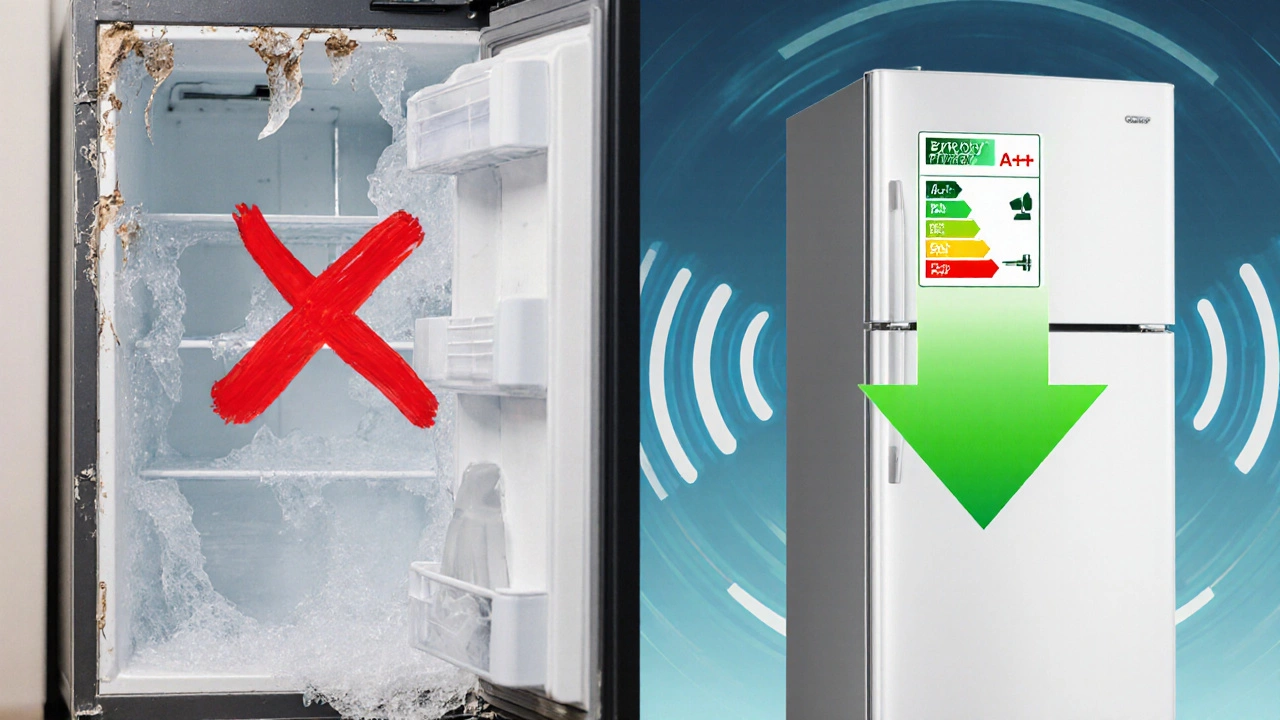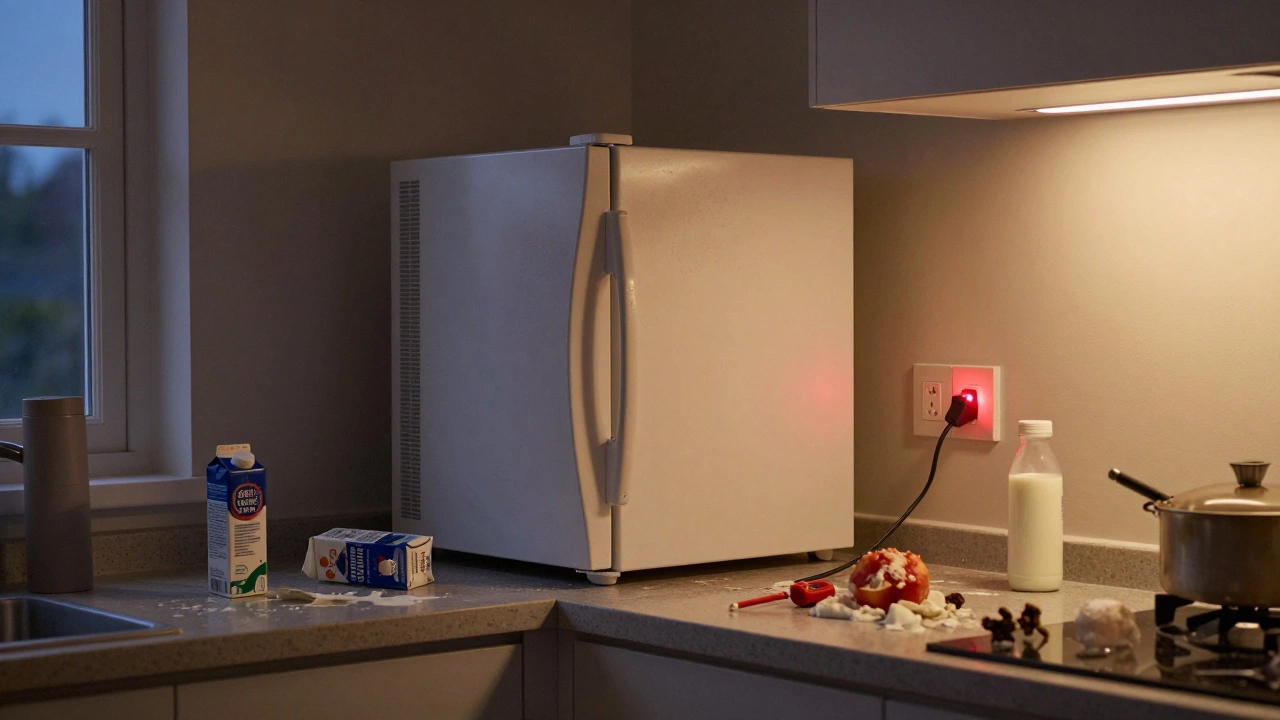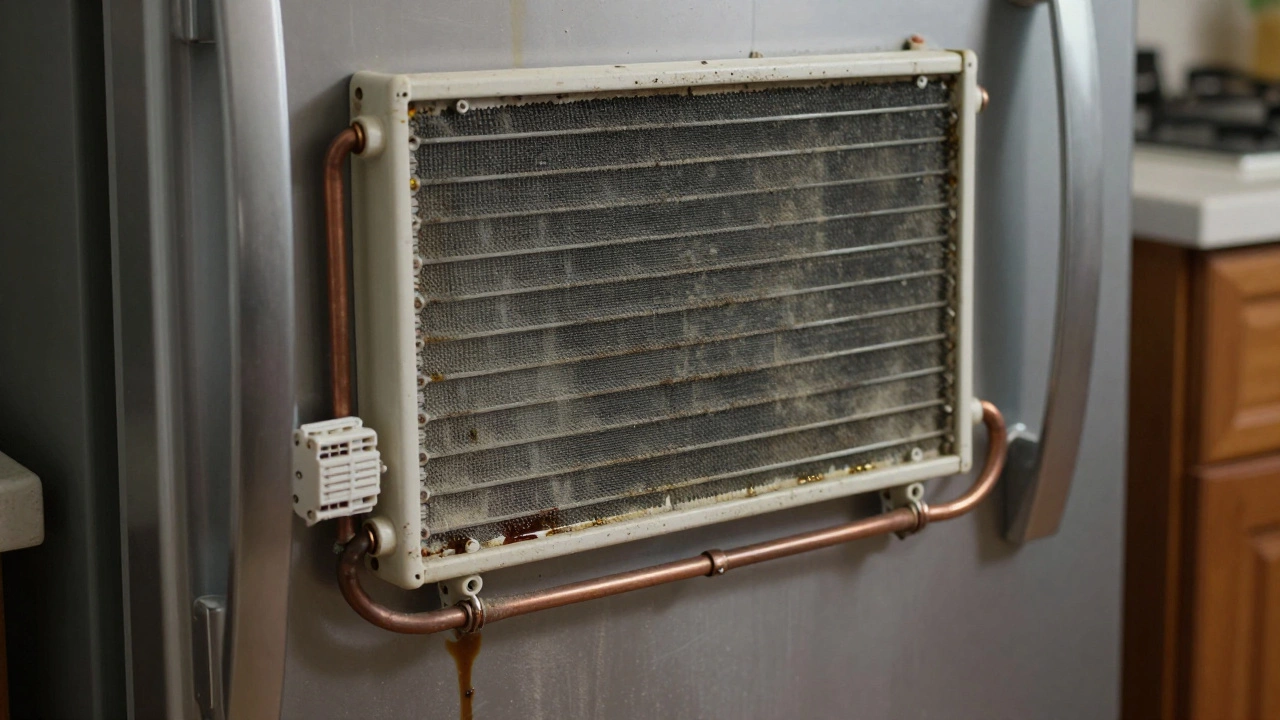
- 15 Nov 2025
- Gideon Thornton
- 0
Refrigerator Repair vs Replacement Calculator
Enter Your Fridge Details
Recommendation
Energy Savings
5-Year Energy Savings:
Most people panic when their fridge stops cooling. The food spoils, the house gets warm, and suddenly you’re staring at a $1,200 price tag for a new unit. But before you call for delivery, ask yourself: is it cheaper to repair or replace a refrigerator? The answer isn’t simple. It depends on age, brand, the type of breakdown, and what you’re willing to spend now versus later.
When repair is the smart choice
If your fridge is under 8 years old and the issue is something simple-like a faulty door seal, a clogged condenser coil, or a broken evaporator fan-you’re usually better off fixing it. These repairs typically cost between £80 and £200, depending on parts and labour. In Bristol, local appliance technicians charge around £50-£70 per hour, with most minor fixes taking under an hour.
For example, a friend of mine had her Whirlpool fridge stop cooling last winter. The technician found the evaporator fan motor had burnt out. Replacement part: £45. Labour: £65. Total: £110. Her fridge was 6 years old. She saved over £1,000 by fixing it.
Another common fix: the defrost timer. If ice builds up in the freezer but the fridge stays cold, it’s often not the compressor-it’s just the timer failing. Replacing it costs about £90. A new fridge would cost 10 times that.
When replacement is the only real option
There are three big red flags that mean you should walk away from repair:
- Your fridge is over 10 years old. Most manufacturers design fridges to last 10-15 years. After that, parts become scarce, efficiency drops, and breakdowns multiply.
- The compressor is failing. This is the heart of the fridge. Replacing it costs £400-£700, and even then, there’s no guarantee it won’t fail again in 6 months. At that point, you’re throwing good money after bad.
- The refrigerant is leaking. Modern fridges use R600a or R134a. If the system has a leak, repairing it means locating the leak, welding the line, recharging the gas, and testing for pressure loss. That’s £300-£500 right there-plus, many manufacturers no longer supply parts for older models.
One technician I spoke to in Clifton told me he sees three fridge compressor failures a week. “If the compressor’s gone and the unit’s older than 10 years, I tell them to buy new,” he said. “It’s not about saving money. It’s about not being stuck with a broken fridge again in six months.”
Cost comparison: repair vs replace
Here’s a realistic breakdown of what you’re likely to pay in the UK right now:
| Scenario | Cost Range | Expected Lifespan After Fix |
|---|---|---|
| Door seal replacement | £80-£120 | 5-8 years |
| Evaporator fan motor | £100-£180 | 3-7 years |
| Defrost timer | £80-£110 | 5+ years |
| Compressor replacement | £400-£700 | 1-3 years |
| Refrigerant leak repair | £300-£500 | 2-5 years |
| New energy-efficient fridge | £500-£1,500 | 10-15 years |
Notice something? If you’re paying more than £300 to fix a fridge older than 8 years, you’re likely better off replacing it. The new fridge will use 40-50% less electricity. Over five years, that’s £150-£250 saved on your bill alone.

Energy savings: the hidden math
Old fridges from the 2000s can use over 800 kWh per year. A new A+++ rated fridge uses around 250 kWh. At current UK electricity prices (34p/kWh as of November 2025), that’s £272 saved per year. Multiply that by five years: £1,360.
Even if you spend £1,200 on a new fridge, you break even in under two years just on energy. After that, every pound you save on your bill is pure gain.
And let’s not forget reliability. A new fridge doesn’t just save you money-it saves you stress. No midnight calls to repairmen. No spoiled milk. No guessing if the food’s still safe.
What about extended warranties and insurance?
Some people buy extended warranties when they get a new fridge. Don’t. Most warranties cover only the first 2-3 years, and the most expensive failures (compressor, PCB boards) happen after year 5. You’re paying for coverage you probably won’t need.
Home insurance? Rarely covers appliance breakdown unless it’s due to a power surge or flood. Most policies exclude mechanical wear and tear. So if your fridge dies because the motor gave out, you’re on your own.

What to do if you’re stuck between repair and replace
Here’s a simple decision tree:
- Check the age. If it’s over 10 years, skip repair unless it’s a £50 fix like a door seal.
- Get a quote for repair. If it’s more than half the cost of a new fridge, walk away.
- Look at the energy label. If it’s an old A or B rating, replacing it will pay for itself in under 3 years.
- Ask the technician: “Will this fix last more than 2 years?” If they hesitate, buy new.
One last tip: don’t wait until the fridge dies completely. If it’s struggling-running constantly, making loud noises, or warming up on hot days-get it checked now. A small fix today can avoid a full replacement tomorrow.
Where to buy a new fridge in the UK
If you’re replacing, focus on energy efficiency and warranty. Brands like Bosch, Samsung, and Beko offer reliable models with 10-year compressor warranties. Avoid no-name brands on Amazon or eBay-they often use cheaper compressors and have no local support.
Check out sales in January and September. Retailers clear out old stock then. You can often find A+++ fridges for under £500 during promotions.
And don’t forget to recycle your old one. Most councils offer free collection, or retailers will take it away for £20-£30 when you buy a new one.
Is it worth repairing a 12-year-old fridge?
Generally, no. A 12-year-old fridge is past its expected lifespan. Even if a repair works, the next breakdown is likely just months away. Parts are harder to find, efficiency is poor, and repair costs often exceed half the price of a new unit. Replacing it with a modern A+++ model saves more money in energy bills than the repair costs.
How much does it cost to replace a fridge compressor?
Replacing a fridge compressor in the UK costs between £400 and £700, including labour and refrigerant recharge. This is usually not worth it unless the fridge is under 5 years old and high-end. For older units, this repair is a waste of money-you’re essentially paying to extend the life of a failing system.
Can a fridge be repaired if it’s leaking refrigerant?
Yes, technically. A technician can locate the leak, weld the pipe, and recharge the gas. But if the fridge is over 8 years old, this repair rarely makes sense. Leaks often reappear, and the refrigerant itself is expensive. Plus, older models may not have replacement parts available. Most professionals recommend replacement instead.
How long should a fridge last before needing replacement?
Most fridges last between 10 and 15 years. High-end models with better compressors can reach 18 years. But after 10 years, repair costs rise, energy use increases, and reliability drops sharply. If your fridge is 10+ years old and needs a major repair, replacement is almost always the smarter long-term choice.
Do newer fridges really save that much on electricity?
Yes. A fridge from 2010 uses about 600-800 kWh per year. A new A+++ model uses 200-280 kWh. At 34p per kWh, that’s £170-£270 saved per year. Over five years, that’s £850-£1,350 in savings-enough to cover the cost of a new fridge and still leave money in your pocket.
Final decision: what to do today
If your fridge is under 8 years old and the repair is under £200, fix it. Simple. If it’s older than 10, and the repair costs more than £300, buy new. And if you’re unsure, ask the technician: “If this was your fridge, would you fix it or replace it?” Most will tell you the truth.
Don’t let guilt or nostalgia keep you tied to a broken machine. A new fridge isn’t just a purchase-it’s an investment in time, peace of mind, and lower bills. And in the long run, that’s always cheaper than hoping your old one lasts another month.




